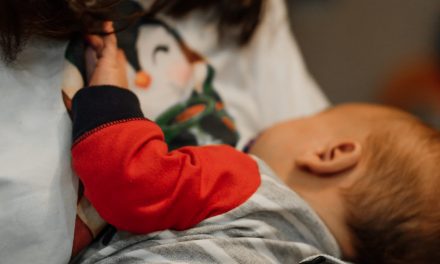Watching your little one go through sudden phases of newborn hiccups can get you tensed as a parent. However, hiccups in newborns are a normal, healthy phenomenon, and it only means the baby has a healthy brain and is growing well.
Hiccups generally tend to be uncomfortable for adults. As a parent, it is only normal for you to assume that the same applies to your little love. The same might apply to babies, but your baby may often sleep through hiccups, which is normal too.
There are many reasons for newborn hiccups, and through this article, we will tell you how to overcome them.
What Causes Newborn Hiccups To Occur?
The reason behind newborn hiccups is a contraction of the diaphragm and the quick closing of the baby’s vocal cords. The diaphragm is the muscle at the end of your baby’s chest whose contraction and relaxation help your baby breathe. Any irritation caused to the baby’s diaphragm might lead to hiccups.
So, when your newborn is getting hiccups, their diaphragm is involuntarily contracting. Because of this, the air getting sucked in by your baby is done so more forcefully than usual. Since this force of air hits your baby’s vocal cords, it leads them to close very suddenly, and that causes the little hiccup sound.
The irritation of your baby’s diaphragm could be because the baby was eating too fast or too much. Even excitement can cause hiccups to occur.
This is the science behind newborn hiccups, and there is absolutely nothing that one needs to be scared of. Hiccups are as natural as they get, but yes, it is also understandable why you would be a little concerned since watching your little one experience hiccups can be scary.
How To Get Rid Of Your Baby’s Hiccups?
Across generations in our country, many reasons are stated as the cause for hiccups. Most of them are myths; for example, one of them is that someone may be remembering your newborn. Or the appetite of your child is increasing. Another reason stated often is that your newborn is getting hiccups because they have gas.
Now, as domestic as these sound, these causes have domestic solutions too. For instance, to stop hiccups, we suggest that you blow air into your baby’s mouth or ear. Some also say feeding the baby a teaspoonful of sugar or honey mixed in water can stop the hiccups.
Other home remedies include vigorously tapping the back of the baby to stop the hiccups. Suggestions like startling them or clapping hard in front of them are also recommended.
While some may swear by these remedies, there is no scientific proof that these stop newborn hiccups. Blowing air into a baby’s mouth may be unhygienic, and feeding your newborn honey or sugar could be dangerous. Do not startle or vigorously tap your newborn.
Here are some remedies as suggested by pediatricians that could lower the instances of newborn hiccups:
- Slow down the speed of your feeding. If it has come to your notice that your newborn gets hiccups whenever they are fed, then slow that process down.
- Holding your baby upright after feeding helps. This ensures easy digestion and lowers the chances of getting hiccups.
- Give your baby a pacifier when they get the hiccups. Because as they suck on it, their diaphragm relaxes, which may ultimately stop the hiccups.
- Feed your baby only when they are calm. Feeding them when they are excited or not in the mood might cause the milk not to go down their esophagus well.
How Can You Stop Your Baby’s Hiccups While Sleeping?
It is only normal for newborns to hiccup when they are asleep. These hiccups are harmless and do not affect your baby’s breathing whatsoever. Your baby might not even know that they are hiccupping. However, if you sense that your baby may be experiencing difficulty breathing, you should check with a doctor.
The ways that you can overcome these hiccups while the baby is sleeping are nothing different. As suggested above, using a pacifier or seating your baby upright can stop the hiccups.
Takeaway
Newborn hiccups aren’t something abnormal. However, if your baby hasn’t stopped hiccupping for a very long time, you can consult a doctor. The frequency of newborn hiccups tends to reduce by the age of one. Till then, if your baby seems happy, is feeding well and is achieving all their milestones, accept these tiny hiccups as a part of your baby’s growth journey.
Also read: Things To Know About Newborns






